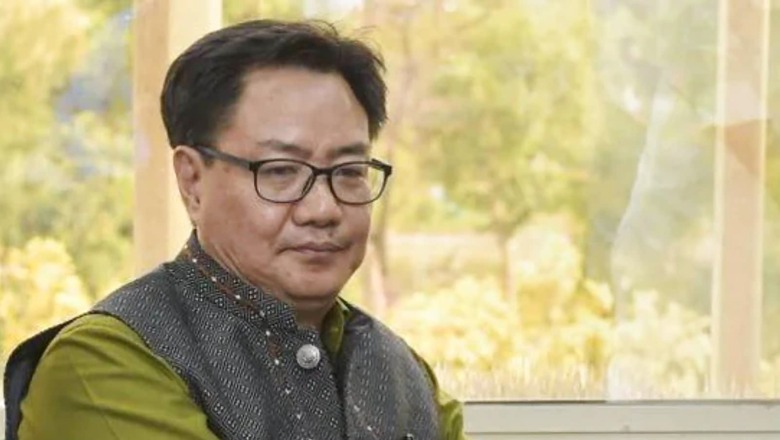
views
Union law minister Kiren Rijiju has called the current system of judicial appointments a matter of concern. Speaking exclusively to CNN-News18, he said that judges should focus on their primary responsibility of justice delivery rather than appointments. “My understanding is that it is always better for the judges to devote themselves to the delivery of justice. Primary duty of the judges is to decide on cases and provide justice to the people as fast as possible…” he said.
The law minister said that it isn’t just him but also members of the bar, civil society, and judiciary who have expressed concerns about the “opaque ” system of collegium appointments.
“Many judges, advocates, civil societies, everybody feels the same thing that I have been saying…But we have no alternative right now because the collegium system has given this role to the judges and the collegium system is very opaque and people are not aware of how names are picked up on what basis the names are generated,” Rijiju told CNN-News18.
He clarified that his criticism was of the current system and not of the judges involved in the collegium or the appointment process.
‘Collegium system is time-taking’
The law minister argued that this system of judges appointing judges is not followed anywhere in the world except India. He said that the provisions made in the National Judicial Appointments Commission (NJAC) Act were best suited for judicial appointment and it was also the “will of the nation”.
“When it comes to the National Judicial Appointments Commission, it was an Act passed by Parliament unanimously…All parties came together and passed this particular Act in both houses of Parliament…So, when all parties join, it means it is the collective will of the nation…So once a collective will of the nation has been brought together by all parties and passed through Parliament, we were expecting that the judiciary or the Supreme Court will respect the will of the people and will of Parliament…But the Supreme Court in its own wisdom struck it down…So there is a sense, and as law minister, I feel that the Supreme Court has not agreed with the will of the people of India,” Rijiju said.
He argued that the alternative mechanisms of appointments suggested were not better than what NJAC provided but since the SC struck it down, the “time-taking” collegium system had to be continued.
“The senior judges, especially the members of the collegium, are fully occupied in the process of appointment. It takes precious time as well as the consulting judges…are, you know, those who are relevant for the appointment of the particular judges. So once a consulting judge is asked to give his preferences, comments and everything for the appointment of the judges then it also takes lots of their precious time,” he said, adding that the right person must be picked for the right job without wasting so much time of the judiciary.
The collegium system of appointment was evolved after rulings from the Supreme Court of India in three cases. The system entails the Chief Justice and the next four senior-most judges recommending the names of candidates to the union government. The government can express its reservations, if any, but is powerless if the collegium reiterates a candidate’s name.
The NJAC Act of 2014 sought to scrap the collegium system and give a greater say to the executive in the appointment of judges.
The Supreme Court, however, called the NJAC Act unconstitutional in a 2015 ruling and struck it down.
Consultation on for alternative mechanism?
When CNN-News18 asked the union law minister if the Chief Justice of India or the senior judges of the Supreme Court are being consulted to look for an alternative mechanism for appointments, Rijiju indicated some progress but remained noncommittal on what the consultation entails.
“That I will tell when we get into some process of consultation. We keep discussing many things but I cannot divulge our informal or formal talks unless it comes into some shape…But the system which is prevalent is not actually the best system,” he said.
Read all the Latest India News here




















Comments
0 comment